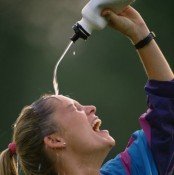We've all heard the old saw: "It's not the heat; it's the humidity." Well, during this extended early heat wave in Mississippi, the heat really is the thing to watch out for. Especially for those who finds themselves outdoors for any length of time, not paying attention to what your body requires in this unseasonable heat can make you sick. In extreme cases, this kind of heat can kill.
In an effort to protect some of the most vulnerable from effects of the heat wave, the city of Jackson is encouraging senior citizens, who are especially prone to heat exhaustion and heat stroke, to come to any of the multipurpose Senior Citizens Community Centers for relief from the heat. Qualified individuals over 55 who live in Jackson are eligible, according to WAPT. Call one of the centers below for additional information.
• Golden Key Community Center, 3450 Albermarle Road, 601-960-2163
• Johnnie Champion Community Center, 1355 Hattiesburg Street, 601-960-1918
• Northside Community Center, 104 East Northside Drive, 601-960-2166
• Smith Robertson Community Center, 505 John Hart Street, 601-960-2167
• Sykes Park Center, 520 Sykes Road, 601-960-2161
• T. L. Love Community Center, 2912 Holmes Avenue, 601-960-2160
• Tougaloo Community Center, 318 Vine Street, 601-960-1423
All centers are open from 8 a.m. until 4 p.m., Monday through Friday. Hours will be extended as necessary, and weekend services will be provided upon request, city officials told WAPT.
Young children, and people who are overweight, elderly or ill are especially vulnerable to the heat, which kills an average of 175 Mississippians every year. The station also provided the following important information on protecting yourself from the heat:
• Stay indoors as much as possible and limit exposure to the sun.
• Stay on the lowest floor out of the sunshine if air conditioning is not available.
• Consider spending the warmest part of the day in public buildings such as libraries, schools, movie theaters, shopping malls and other community facilities.
• Eat well-balanced, light, and regular meals. Avoid using salt tablets unless directed to do so by a physician.
• Drink plenty of water. Persons who have epilepsy or heart, kidney or liver disease; are on fluid-restricted diets; or have a problem with fluid retention should consult a doctor before increasing liquid intake.
• Limit intake of alcoholic beverages.
• Dress in loose-fitting, lightweight and light-colored clothes that cover as much skin as possible.
• Protect face and head by wearing a wide-brimmed hat.
• Check on family, friends and neighbors who do not have air conditioning and who spend much of their time alone.
• Never leave children or pets alone in closed vehicles.
• Avoid strenuous work during the warmest part of the day. Use a buddy system when working in extreme heat and take frequent breaks.
Signs Of Heath Exhaustion
• Heavy sweating but skin may be cool, pale or flushed.
• Weak pulse.
• Normal body temperature is possible, but temperature will likely rise.
• Fainting or dizziness, nausea, vomiting, exhaustion and headaches are possible.
Signs Of Heat Stroke
• High body temperature (105+).
• Hot, red, dry skin.
• Rapid, weak pulse and rapid shallow breathing.
• Victim will probably not sweat unless victim was sweating from recent strenuous activity.
• Possible unconsciousness.


